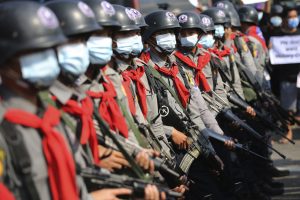As Myanmar’s military cracked down on anti-coup protests across the country with live ammunition, resulting in at least 18 deaths, China continued to refrain from criticizing the Tatmadaw. In fact, Chinese state media and officials avoided even mentioning the bloodshed.
That (lack of) response was the natural extension of Beijing’s refusal to take sides in the conflict between Myanmar’s generals and the country’s people since the military seized power by deposing the democratically elected government on February 1.
At an informal United Nations General Assembly session devoted to the situation in Myanmar on February 26, China’s U.N. Ambassador Zhang Jun laid down China’s position: “What happened in Myanmar is, in essence, Myanmar’s internal affairs.” Zhang did, however, express China’s continued interest in international mediation, whether by ASEAN, the U.N., or even Beijing itself, which he said was “engaging and communicating with relevant parties in Myanmar to further facilitate deescalation of the situation and return to normalcy at an early date.”
Zhang was careful not to express any preference for how the situation was resolved, however, a stark comparison with governments in the West. A statement from the G-7 foreign ministers, for example, “condemn[ed] the coup in Myanmar” and called for “the immediate and unconditional release of those detained arbitrarily, including State Counsellor Aung San Suu Kyi and President Win Myint.” China’s line is that, as long as the situation is handled peacefully, it doesn’t much care what the end result is: a return to military rule, or the salvaging of Myanmar’s flawed democracy.
While Beijing has its own reasons to wish the National League for Democracy (NLD) was back in power, its long-standing noninterference policy precludes any harsh statements against the coup. In addition, China has strong strategic and economic interests in Myanmar, where it hopes to continue building out the China-Myanmar Economic Corridor to provide an alternative route of access to the Bay of Bengal.
The result is that China has been scrupulously neutral on the events to its southwest. Chinese officials and state media have even refrained from calling the takeover a coup, a term the military leadership in Myanmar has rejected.
But Zhang did express one clear wish in his statement: an end to violence. “[A]ll parties should maintain calm and restraint, refrain from intensifying tensions, escalating the situation and using violence, so as to prevent bloodshed,” he said.
That wish was shattered on February 28, the deadliest day since the coup, when Myanmar’s security forces fired live ammunition at protesters in cities across the country. At least 18 died and another 30 were wounded.
The violence sparked immediate condemnation from Western governments – but despite its stated preference for “preventing bloodshed,” Beijing offered no criticism, or even comment, on the deadly turn of events.
When asked about the violence in a regular press conference on March 1, Chinese Foreign Ministry spokesperson Wang Wenbin did not directly address the deaths. The closest he came to mentioning the bloodshed was a comment that “cooling down the situation in Myanmar is a top priority and also a consensus of the international community.”
“China is following the current situation in Myanmar and hopes that each party will bear in mind the long-term goal of national development and stability, exercise restraint, properly handle differences under the constitution and legal framework, and maintain political and social stability,” Wang said. “…The international community should respect Myanmar’s sovereignty, political independence, territorial integrity and national unity, and help all relevant parties in Myanmar engage in dialogue and reconciliation in accordance with the wishes and interests of the Myanmar people, properly handle differences, maintain political and social stability, resolve outstanding issues in a peaceful manner, and continue to promote domestic democratic transformation process in an orderly manner.”
Chinese media, meanwhile, largely avoided covering the use of deadly force in Myanmar, with only a few isolated mentions in private online media platforms.
While Wang paid lip service to “the wishes and interest of the Myanmar people” and the “democratic transformation process,” it’s abundantly clear that these are secondary concerns to the restoration of stability – a return, in other words, to business as usual. That appears a remote hope at the moment. As the protest movement continues to gain steam, even while the military signals its willingness to resort to ever-more violent methods to quell dissent, China’s silence and carefully crafted neutrality look more and more like choosing a side.
And of course, China’s leaders have their own history of bloodily suppressing protests calling for democracy. Given their distaste for such popular movements, it’s not hard to guess where the Chinese Communist Party’s sympathies lie in Myanmar at the current moment.

































